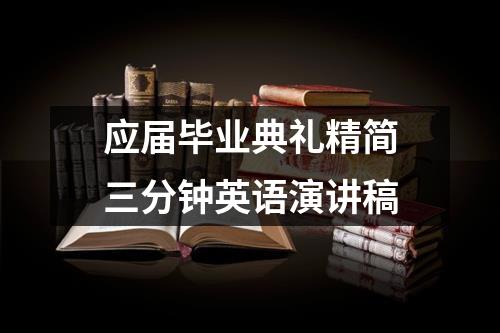应届毕业典礼精简三分钟英语演讲稿
- 工作总结
- 2024-06-04
- 177热度
- 0评论
【简介】下面是小编为大家整理的应届毕业典礼精简三分钟英语演讲稿(共14篇),欢迎大家借鉴与参考,希望对大家有所帮助。在此,感谢网友“壹生又你”投稿本文!

I am honoured to be at the Royal Hospital today as your reviewing officer once again, on this the 75th Anniversary of D-Day.
Not only is today a prominent historical occasion, it is also a special day in the Royal Hospital calendar – bringing together families, old friends and the chance to make new ones.
Both your founder King Charles II, and Sir Christopher Wren himself would be delighted to know that the institution which opened its doors to the first Pensioners over 325 years ago, continues to fulfil its original purpose of giving exceptional care to soldiers in retirement.
They’d also be amused to hear about the late-night cricket in the hallways! Much less the serenading by Colin, who I am told is Royal Variety standard, but let’s assume they haven’t seen your synchronised buggy drill quite yet!
Now I stand here before you to not only acknowledge the incredible contribution you have made to this nation, but to acknowledge that you, my friends, are also seriously good fun to be around!
You will always stand out in your scarlet coats and white gloves, but to me, whether I see you at Westminster Abbey, the Chelsea Flower Show, Twickenham Stadium, or the pub, I notice that you are always smiling.
Don’t ever underestimate the joy that you bring to everyone you meet. You represent something really quite special, you are special, and society will always recognise that. That is an important part of your legacy.
Here, I see a community that continues to value the importance of teamwork which military service in particular can teach you.
It’s a community that focuses on supporting each other with kindness, respect and compassion, as well as reaching out to serve the wider community.
I have just visited the infirmary and seen the excellent facilities and care being provided to those pensioners who are unable to be on parade here today. No doubt they’re watching from the windows cheering you all on.
I think we should all be incredibly proud and grateful knowing that 46 of you here fought in the Second World War; many of you in other conflicts including Korea, Malaya, Borneo and that the ‘youngsters’ among you wear Northern Ireland, South Atlantic and First Gulf War Medals with pride.
On this 75th Anniversary of D-Day, I can comfortably speak for everyone when I say we are honoured to be in the presence of six Normandy Landing veterans.
To all who are on parade today, I can only say that you are a constant reminder of the great debt we owe those who have served this nation.
You embody the fitting home that awaits them in the peace and tranquillity of the Royal Hospital, should they want it.
But more widely, wherever you are, your presence is a symbol of the sacrifices that have been made by all veterans to sustain the freedoms and democracy we value so deeply today.
Ladies and Gentleman, could I ask that those who are able to, please stand in recognition of our veterans. We stand together and remember those who have sacrificed their lives for our freedom.
And for you here today, who have served us so greatly and with such honour, I congratulate you on the smartness of your turnout and the steadiness of your bearing. I thank you for inviting me here today and I wish you all the health and happiness you so richly deserve.
Thank you.
He just said before he left the podium that there is a gift coming.
Thank you, Trevor, and Mike, thank you very much for your thoughtful and truly inspiring remarks and for choosing MIT for that remarkable announcement. Thank you so very much.
To the graduates of : once more, congratulations. My job today is to deliver a charge to you, and I’ll get to that in a minute. But first, I want to recognize the people who helped you charge this far.
To everyone who came here this morning to celebrate our graduates, welcome to MIT.
And…and to the parents and families of today’s graduates, a huge “congratulations” to you as well. This day is the joyful result of your loving support and sacrifice. Please accept our deep gratitude and admiration.
Now, graduates, for this next acknowledgment, I’m going to need your help. Over my left shoulder, there is a camera. In a moment, I’m going to ask you, all of you, to cheer and wave to it, all right? Just cheer and wave. And I would love it if you make it loud.
So next, I’d like to offer a special greeting to all those who are not able to come to campus, but who are cheering on today’s graduates online from locations all over the globe. We’re very glad to have you with us, too!
So graduates, this is the moment. Please cheer and wave! No, wait, wait. I’m pretty sure you have taken physics and electricity – so you must know something about amplification. So let’s try this again. And remember, I still have your diplomas. So one more time, let’s cheer and wave.
Thank you. It’s truly great to have all of you here on Killian Court, on this wonderful day, for this tremendously important occasion.
But before we send our new graduates out into the world, first, I must beg your indulgence on behalf of my wife. Christine Reif is a wonderful person. In fact, she’s sitting right there. But she has one weakness: She’s crazy about astronauts and about outer space.
As you just heard by the commencement speaker, July 20 of this year marks 50 years since the first human walked on the moon. For those of you graduating, I know this is ancient history – your parents’ history, maybe your grandparents’ history. So perhaps not all of you have been focused on the 50th anniversary of Apollo 11.
But because Mrs. Reif also loves the Institute, she has asked that, in addition to giving you a charge, I also prepare you for a mission.
英语演讲稿1
I am honoured to be at the Royal Hospital today as your reviewing officer once again, on this the 75th Anniversary of D-Day.
Not only is today a prominent historical occasion, it is also a special day in the Royal Hospital calendar – bringing together families, old friends and the chance to make new ones.
Both your founder King Charles II, and Sir Christopher Wren himself would be delighted to know that the institution which opened its doors to the first Pensioners over 325 years ago, continues to fulfil its original purpose of giving exceptional care to soldiers in retirement.
They’d also be amused to hear about the late-night cricket in the hallways! Much less the serenading by Colin, who I am told is Royal Variety standard, but let’s assume they haven’t seen your synchronised buggy drill quite yet!
Now I stand here before you to not only acknowledge the incredible contribution you have made to this nation, but to acknowledge that you, my friends, are also seriously good fun to be around!
英语演讲稿2
You will always stand out in your scarlet coats and white gloves, but to me, whether I see you at Westminster Abbey, the Chelsea Flower Show, Twickenham Stadium, or the pub, I notice that you are always smiling.
Don’t ever underestimate the joy that you bring to everyone you meet. You represent something really quite special, you are special, and society will always recognise that. That is an important part of your legacy.
Here, I see a community that continues to value the importance of teamwork which military service in particular can teach you.
It’s a community that focuses on supporting each other with kindness, respect and compassion, as well as reaching out to serve the wider community.
I have just visited the infirmary and seen the excellent facilities and care being provided to those pensioners who are unable to be on parade here today. No doubt they’re watching from the windows cheering you all on.
I think we should all be incredibly proud and grateful knowing that 46 of you here fought in the Second World War; many of you in other conflicts including Korea, Malaya, Borneo and that the ‘youngsters’ among you wear Northern Ireland, South Atlantic and First Gulf War Medals with pride.
英语演讲稿3
On this 75th Anniversary of D-Day, I can comfortably speak for everyone when I say we are honoured to be in the presence of six Normandy Landing veterans.
To all who are on parade today, I can only say that you are a constant reminder of the great debt we owe those who have served this nation.
You embody the fitting home that awaits them in the peace and tranquillity of the Royal Hospital, should they want it.
But more widely, wherever you are, your presence is a symbol of the sacrifices that have been made by all veterans to sustain the freedoms and democracy we value so deeply today.
Ladies and Gentleman, could I ask that those who are able to, please stand in recognition of our veterans. We stand together and remember those who have sacrificed their lives for our freedom.
And for you here today, who have served us so greatly and with such honour, I congratulate you on the smartness of your turnout and the steadiness of your bearing. I thank you for inviting me here today and I wish you all the health and happiness you so richly deserve.
Thank you.
英语演讲稿4
He just said before he left the podium that there is a gift coming.
Thank you, Trevor, and Mike, thank you very much for your thoughtful and truly inspiring remarks and for choosing MIT for that remarkable announcement. Thank you so very much.
To the graduates of : once more, congratulations. My job today is to deliver a charge to you, and I’ll get to that in a minute. But first, I want to recognize the people who helped you charge this far.
To everyone who came here this morning to celebrate our graduates, welcome to MIT.
And…and to the parents and families of today’s graduates, a huge “congratulations” to you as well. This day is the joyful result of your loving support and sacrifice. Please accept our deep gratitude and admiration.
Now, graduates, for this next acknowledgment, I’m going to need your help. Over my left shoulder, there is a camera. In a moment, I’m going to ask you, all of you, to cheer and wave to it, all right? Just cheer and wave. And I would love it if you make it loud.
So next, I’d like to offer a special greeting to all those who are not able to come to campus, but who are cheering on today’s graduates online from locations all over the globe. We’re very glad to have you with us, too!
英语演讲稿5
So graduates, this is the moment. Please cheer and wave! No, wait, wait. I’m pretty sure you have taken physics and electricity – so you must know something about amplification. So let’s try this again. And remember, I still have your diplomas. So one more time, let’s cheer and wave.
Thank you. It’s truly great to have all of you here on Killian Court, on this wonderful day, for this tremendously important occasion.
But before we send our new graduates out into the world, first, I must beg your indulgence on behalf of my wife. Christine Reif is a wonderful person. In fact, she’s sitting right there. But she has one weakness: She’s crazy about astronauts and about outer space.
As you just heard by the commencement speaker, July 20 of this year marks 50 years since the first human walked on the moon. For those of you graduating, I know this is ancient history – your parents’ history, maybe your grandparents’ history. So perhaps not all of you have been focused on the 50th anniversary of Apollo 11.
But because Mrs. Reif also loves the Institute, she has asked that, in addition to giving you a charge, I also prepare you for a mission.
Thank you. Thank you.
Good morning, Class of 2019!
Thank you, President Tessier-Lavigne, for that very generous introduction. I’ll do my best to earn it.
Before I begin, I want to recognize everyone whose hard work made this celebration possible, including the groundskeepers, ushers, volunteers and crew. Thank you.
I’m deeply honored and frankly a little astonished to be invited to join you for this most meaningful of occasions.
Graduates, this is your day. But you didn’t get here alone.
Family and friends, teachers, mentors, loved ones, and, of course, your parents, all worked together to make you possible and they share your joy today. Here on Father’s Day, let’s give the dads in particular a round of applause.
Stanford is near to my heart, not least because I live just a mile and a half from here.
Of course, if my accent hasn’t given it away, for the first part of my life, I had to admire this place from a distance.
I went to school on the other side of the country, at Auburn University, in the heart of landlocked Eastern Alabama.
In just the four years that you’ve been here at the Farm, things feel like they have taken a sharp turn.
Crisis has tempered optimism. Consequences have challenged idealism. And reality has shaken blind faith.
And yet we are all still drawn here.
For good reason.
Big dreams live here, as do the genius and passion to make them real. In an age of cynicism, this place still believes that the human capacity to solve problems is boundless.
But so, it seems, is our potential to create them.
That’s what I’m interested in talking about today. Because if I’ve learned one thing, it’s that technology doesn’t change who we are, it magnifies who we are, the good and the bad.
Our problems – in technology, in politics, wherever – are human problems. From the Garden of Eden to today, it’s our humanity that got us into this mess, and it’s our humanity that’s going to have to get us out.
First things first, here’s a plain fact.
Silicon Valley is responsible for some of the most revolutionary inventions in modern history.
From the first oscillator built in the Hewlett-Packard garage to the iPhones that I know you’re holding in your hands.
Social media, shareable video, snaps and stories that connect half the people on Earth. They all trace their roots to Stanford’s backyard.
But lately, it seems, this industry is becoming better known for a less noble innovation: the belief that you can claim credit without accepting responsibility.
We see it every day now, with every data breach, every privacy violation, every blind eye turned to hate speech. Fake news poisoning our national conversation. The false miracles in exchange for a single drop of your blood. Too many seem to think that good intentions excuse away harmful outcomes.
But whether you like it or not, what you build and what you create define who you are.
It feels a bit crazy that anyone should have to say this. But if you’ve built a chaos factory, you can’t dodge responsibility for the chaos. Taking responsibility means having the courage to think things through.
And there are few areas where this is more important than privacy.
If we accept as normal and unavoidable that everything in our lives can be aggregated, sold, or even leaked in the event of a hack, then we lose so much more than data.
We lose the freedom to be human.
Think about what’s at stake. Everything you write, everything you say, every topic of curiosity, every stray thought, every impulsive purchase, every moment of frustration or weakness, every gripe or complaint, every secret shared in confidence.
In a world without digital privacy, even if you have done nothing wrong other than think differently, you begin to censor yourself. Not entirely at first. Just a little, bit by bit. To risk less, to hope less, to imagine less, to dare less, to create less, to try less, to talk less, to think less. The chilling effect of digital surveillance is profound, and it touches everything.
What a small, unimaginative world we would end up with. Not entirely at first. Just a little, bit by bit. Ironically, it’s the kind of environment that would have stopped Silicon Valley before it had even gotten started.
We deserve better. You deserve better.
If we believe that freedom means an environment where great ideas can take root, where they can grow and be nurtured without fear of irrational restrictions or burdens, then it’s our duty to change course, because your generation ought to have the same freedom to shape the future as the generation that came before.
Graduates, at the very least, learn from these mistakes. If you want to take credit, first, learn to take responsibility.
You may not know this, but I was on the sailing team all four years.
It wasn’t easy. Back then, the closest marina was a three-hour drive away. For practice, most of the time we had to wait for a heavy rainstorm to flood the football field. And tying knots is hard! Who knew?
Yet somehow, against all odds, we managed to beat Stanford every time. We must have gotten lucky with the wind.
Kidding aside, I know the real reason I’m here, and I don’t take it lightly.
Stanford and Silicon Valley’s roots are woven together. We’re part of the same ecosystem. It was true when Steve stood on this stage 14 years ago, it’s true today, and, presumably, it’ll be true for a while longer still.
The past few decades have lifted us together. But today, we gather at a moment that demands some reflection.
Fueled by caffeine and code, optimism and idealism, conviction and creativity, generations of Stanford graduates (and dropouts) have used technology to remake our society.
But I think you would agree that, lately, the results haven’t been neat or straightforward.
In the past decade alone, we’ve seen historic hurricanes devastate islands across the Caribbean. We’ve seen ‘1,000-year floods’ hit the Midwestern and Southern United States multiple times in a decade. And we’ve seen record-breaking wildfires ravage California and record-breaking typhoons kill thousands in the Philippines.
This is a true crisis. And if we fail to rise to the occasion, your generation, your children, and grandchildren will pay a terrible price. So scientists know there can be no delay in taking action – and many government and political leaders around the world are starting to understand that.
Yet here in the United States, our federal government is seeking to become the only country in the world to withdraw from the Paris Climate Agreement – the only one. Not even North Korea is doing that.
Those in Washington who deny the science of climate change are no more based in reality than those who believe the moon landing was faked. And while the moon landing conspiracy theorists are relegated to the paranoid corners of talk radio, climate skeptics occupy the highest positions of power in the United States government.
Now, in the administration’s defense, climate change, they say, is only a theory – yeah, like gravity is only a theory.
People can ignore gravity at their own risk, at least until they hit the ground. But when they ignore the climate crisis, they are not only putting themselves at risk, they are putting all humanity at risk.
The truth is, success is a process—you can ask anybody who’s been successful. I just passed on the lane up here here, successful restauranteur Danny Meyer, who’s sitting here with his family—Charles is graduating today. Ask Danny or anybody who’s successful, you go to any one of his restaurants—Shake Shack, love it!—Union Square Cafe, Gramercy Tavern—you will be impressed by not only the food, but the radical hospital and service. Service is not just about when you’re getting served.
When I started my talk show, I was just so happy to be on television. I was so happy to interview members of the Ku Klux Klan. I thought I was interviewing them to show their vitriol to the world, and then I saw them using hand signals in the audience—and realized they were using me, and using my platform. Then we did a show where someone was embarrassed, and I was responsible for the embarrassment. We had somehow talked a man who was cheating on his wife to come on the show with the woman he was cheating with and, on live television, he told his wife that his girlfriend was pregnant. That happened on mywatch.
Shortly after I said: I’m not gonna do that again. How can I use this show to not just be a show, but allow it to be a service to the viewer? That question of “How do we serve the viewer?” transformed the show. And because we asked that question every single day from 1989 forward—with the intention of only doing what was in service to the people who were watching—that is why now, no matter where I go in the world, people say “I watched your show, it changed my life.” People watched and were raised by that show. I did a good job of raising a lot of people, I must say. That happened because of an intention to be of service.
Instead of challenging Americans to believe in our ability to master the universe, as President Kennedy did, the current administration is pandering to the skeptics who, in the 1960s, looked at the space program and only saw short-term costs and long-term benefits.
President Kennedy’s era earned the nickname, ‘The Greatest Generation’ – not only because they persevered through the Great Depression and won the Second World War. They earned it because of determination to rise, to pioneer, to innovate, and to fulfill the promise of American freedom.
They dreamed in moonshots. They reached for the stars. And they began to redeem – through the Civil Rights Movement – the failures of the past. They set the standard for leadership and service to our nation’s ideals.
Now, your generation has the opportunity to join them in the history books. The challenge that lies before you – stopping climate change – is unlike any other ever faced by humankind. The stakes could not be higher.
If left unchecked, the climate change crisis threatens to destroy oceanic life that feeds so many people on this planet. It threatens to breed war by spreading drought and hunger. It threatens to sink coastal communities, devastate farms and businesses, and spread disease.
★
★
★
★
★
★
★
★
★
★



